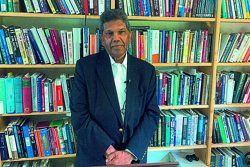Since the Caribbean Community is, as we know, not a single state, the tendency towards diplomatic unilateralism on the part of one or other member state is, or has become, a normal expectation. But on the other hand, there has sometimes tended to be a procedural expectation in Caricom, that given the need for unity if one or other country is to prevail in a process of wider international candidate selection, a regional process of negotiation would settle the matter, and present a single candidate to the wider international community.
Dominica, Antigua and Barbuda and Trinidad & Tobago, as single members of a variety of international organisations will have been well aware of this general negotiating position, which initially allows for the freedom any single state to propose a candidate, but at the same time recognizes our governments’ normal position that as small entities, the diplomatic requirements of amassing a substantial number of votes in the international system as a whole, is almost normally beyond the capability of any single Caricom state.
Yet, in the recent search for a Secretary General of the Commonwealth our governments proceeded to the bitter end in going forward with two of the three potential candidates, Trinidad & Tobago’s candidate having simultaneously sought and gained selection to the country’ s parliament. And in any case, as things turned out, the change of government in that country would have almost inevitably meant a withdrawal of the Trinidad candidate, a recent, former Minister of the last Trinidad administration.
On the face of it, Dominica, proposing an individual born in the country, but simultaneously one, as a British citizen, substantially supported by the United Kingdom government, in which country she had had a status as a member of Lords and Minister of a previous British government, would have been well aware that, in the search for international support, the country of her birth would have had a substantial advantage, if only from the point of view of Britain’s possession and utilization of substantial diplomatic resources for persuading potential voters in the selection process.
No head of government in the Caribbean Community, on hearing at the recent Caricom meeting just prior to the Commonwealth gathering, that Dominica had not only its own diplomatic resources, but those of the ‘mother country’ of the Commonwealth in support of its candidate, would have doubted that the candidate of Dominica had the better, indeed the almost inevitable, possibility of prevailing in the choice of candidate.
None of this would have been surprising to Caribbean governments, and indeed when Sir Ronald Sanders indicated withdrawal of his candidature some weeks ago, there seemed to be a general feeling that he and his promoting government had come to that conclusion. And in any case, if his then decision was intended, as some might have thought, as a stratagem to force movement within Caricom in his direction, then it appears, at least in retrospect, that that decision to reconsider and rejoin the race, underestimated the political and diplomatic resources, not so much of Dominica, as of the British government.
It will probably also have been the case that most observers with knowledge of the limits of Caricom unity, or of the limits of Caricom even as a fully unified entity, to extensively engage the wider sphere of the variety of the 53 Commonwealth governments, would have predicted the inevitability of the outcome. This was something which the Government of Dominica appeared, by indicating its determined resistance to any Caricom alternative, to appreciate.
In that context, it would appear that the governments of Australia and New Zealand, normally allied to the 9 Commonwealth Pacific countries, were also able to harness their undiluted votes in favour of the British (West Indian) candidate. And thus, what we might call electoral, the competition between Sir Ronald’s proposer, Antigua and Barbuda and the major states of the South Pacific was severely unequal.
The division among the Caribbean governments itself indicates the view of those who voted for Baroness Scotland in the first round, that having done so in sufficient numbers, the Region will have entitled itself to the unprejudiced support of the new Secretary General. Though there will be some in the governments of the Region who will have understood what many thought, at the time, to be the comfort of having one of their own during the three-term regime of Sir Shridath Ramphal.
But undoubtedly, Dominica will have been able to assure those whom it sought to persuade, and succeeded in doing so, that the affinity of Baroness Scotland to the Region will result in a similar situation. And though we cannot know how the vote went, the Prime Minister of Dominica will surely have sought to assure his OECS colleagues that there is now a sufficient possibility of continued intimate access.
What is noticeable about this selection process is the extent of open support, or open opposition for the candidates, something which the Commonwealth system has hardly been accustomed to. Reports in the British press which put a negative stamp on the reputation of Sir Ronald, seemed to be a deliberate attempt to influence public opinion among Commonwealth governments, including in Caricom, in the direction of the British candidate, and at a point in the process when any particular rebuttals were apparently difficult to make.
No doubt Baronness Scotland will feel the necessity to assert a strong presence in the Region, assuring all governments that she is the representative of the whole Commonwealth. And a further expectation must be that the Government of Dominica, which clearly extended itself in support of her candidature, will be looked upon, particularly by its OECS colleague governments, to demonstrate the fruits of their support.
The Region has had the experience of a certain visibility given to it over the years, in terms of its economic, diplomatic and security objectives as substantially small states, during the fifteen year tenure of Sir Shridath Ramphal. The result having now been established, there will certainly be an expectation of some degree of attention to their continued predicament of being small states in an increasingly volatile international arena.









